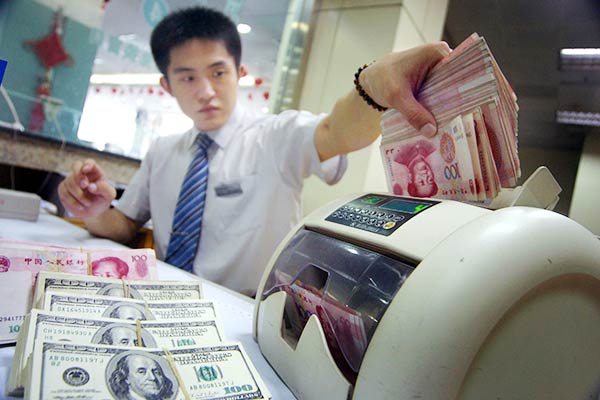New yuan rate 'fixes distortions'
 0 Comment(s)
0 Comment(s) Print
Print E-mail China Daily, August 12, 2015
E-mail China Daily, August 12, 2015
|
|
| The People's Bank of China cut the reference rate against the US dollar to 6.2298 yuan per dollar, down from 6.1162 yuan a day earlier, the lowest level in more than two years.[Photo / China Daily] |
China's central bank devaluated the yuan against the US dollar by 1.86 percent on Tuesday, the largest single-day drop since exchange rate reforms began in January 1994.
The devaluation hit global equities and US oil prices, as investors worried that Beijing's move signaled concerns over growth in the world’s second-largest economy.
The Dow Jones Industrial Average fell 1.2 percent to 17,402.84, erasing most of the previous session's gains. The S&P 500 fell 1 percent to 2,084.07. The pan-European Stoxx Europe 600 index closed 1.6 percent lower.
Oil fell as much as 4 percent on Tuesday after No 2 consumer China devalued its currency, raising questions about its demand for crude, while a new projection showed non-OPEC producers were more resilient than expected to keeping output high amid low prices.
US crude for September delivery CLU5 slipped by $1.95, or 4.3 percent, to $43.01 a barrel by 1530 GMT, after a session low at $42.98. The front-month continuation contract for US crude CLc1 had previously struck a 2015 low of $42.03.
The People's Bank of China cut the reference rate against the US dollar to 6.2298 yuan per dollar, down from 6.1162 yuan a day earlier, the lowest level in more than two years.
In a move seen as a step toward liberalizing the yuan, the People's Bank of China said that it will base the yuan-US dollar exchange rate more on the previous day's closing rate at the interbank foreign exchange market.
The move would correct price distortions from the bank's previous interventions, experts said.
However, the bank stressed that Tuesday's depreciation was a "one-off" move to fix the discrepancy between the reference rate and the market's spot rate. The spot rate has been consistently higher by about 1.5 percent since June.
The currency can fluctuate by as much as 2 percent a day.
The bank's move seemed to catch the global market off guard, with the yuan declining by 2.3 percent in offshore trading in Hong Kong on Tuesday.
Global commodity prices retreated, and yields on 10-year US and German notes dropped more than two basis points.
Ma Jun, chief economist at the central bank's research bureau, told China Daily that the central parity adjustment "does not mean a depreciating trend for the yuan".
"The economic fundamentals can support a stable yuan exchange rate, since China's 7 percent GDP growth is higher than most countries' and is especially higher than the other emerging economies with greater exchange rate fluctuations," Ma said.
A persistent export surplus, large foreign exchange reserves, low inflation, a moderate fiscal deficit and government debt will ensure a stable currency, he added.
Yu Yongding, a former monetary policy adviser for the central bank, said the new method of setting the reference rate signals that "the yuan's era of appreciation has ended", and its exchange rate will be stable or even weaker in the near future, he said.
Markets have exerted persistent downward pressure on the yuan against the backdrop of weak Chinese growth, an expected rate increase by the US Federal Reserve and depreciation of major emerging markets' currencies against the US dollar.
But Yu said the move was a result of the market and shouldn't be seen merely as an attempt to boost the country's flagging exports, which were down by 8.3 percent year-on-year in July.
The bank also promised on Tuesday to enrich foreign exchange products and promote the convergence between onshore and offshore exchange rates.
Zhu Haibin, chief China economist with JP Morgan Chase & Co, said the policy is conducive to the yuan's inclusion in the International Monetary Fund's Special Drawing Rights, as its review last week suggested that the central parity rate should be responsive to changes in market conditions.







Go to Forum >>0 Comment(s)